Iran Insists Talks With Saudi Arabia Will Resume Without Saying When
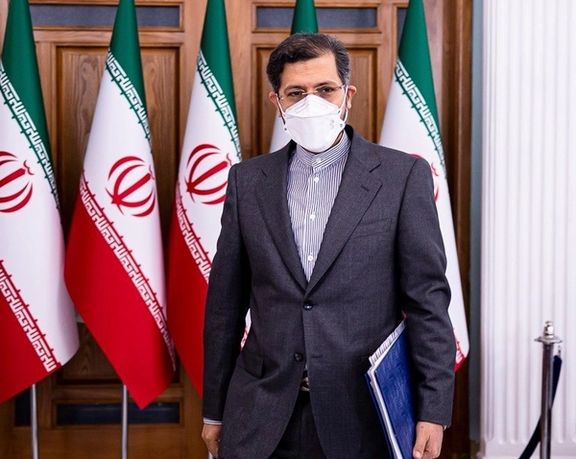
Iran says the next round of talks with Saudi Arabia is on agenda but the presence of Saudi Arabia’s diplomats in Vienna is not related to the Islamic Republic.

Iran says the next round of talks with Saudi Arabia is on agenda but the presence of Saudi Arabia’s diplomats in Vienna is not related to the Islamic Republic.
During his weekly press briefing on Monday, Foreign Ministry spokesman Saeed Khatibzadeh said that the next round of talks will be hosted by Iraq but did not mention a date.
Dodging a question whether Saudi Arabia's position on Lebanon and Hezbollah has any impact on the talks, Khatibzadeh said that “We have tried to continue our relations and talks despite the differences.
Khatibzadeh also sidestepped a question about the presence of a Saudi delegation in Vienna while Iran and world powers are negotiating to revive the 2015 nuclear deal, saying this Tehran had no role in it.
On Saturday, US Special Envoy for Iran Rob Malley met with Saudi Arabia’s ambassador to the international organizations to discuss the latest developments in Iran nuclear talks.
Recently, Tehran has been saying that a new round of Iran-Saudi negotiations will take place, but Riyadh has been so far silent.
Last week, Saudi Arabia’s foreign minister Prince Faisal bin Farhan Al Saud reiterated Riyadh’s concerns about Iran’s “destabilizing role” and “transgressions” in its nuclear program.
Riyadh and Tehran held talks last year to reduce tensions with the aim of restoring diplomatic ties broken since January 2016. So far, the talks have been exploratory with no tangible results.
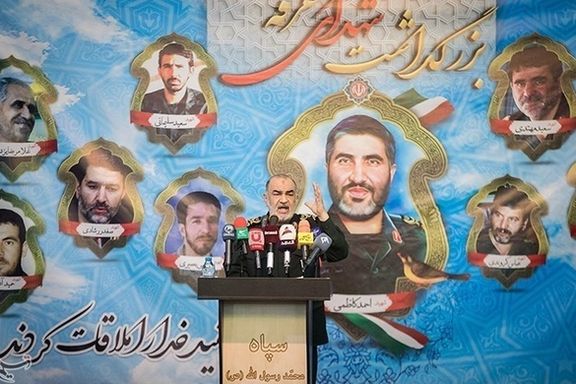
One day after the White House warned Iran against harming any Americans, the commander of IRGC said Monday that revenge for the killing of Qasem Soleimani is not yet complete.
In a ceremony in Tehran, Hossein Salami without referring to the warning by US national security advisor Jake Sullivan, said, “We have taken part of the revenge and part of it is still unfulfilled, and everyone certainly knows it. American officials should know that they cannot conduct aggression against a nation and avoid revenge.”
General Soleimani, who was Iran’s top military and intelligence operator in the region organizing militant proxy forces, was killed by a decision of the United States in a drone strike in Baghdad on January 3, 2020. Iran retaliated by firing ballistic missiles at bases in Iraq hosting US troops five days later.
On Saturday, Iran issued a new list of Americans it considers responsible for Soleimani’s killing after senior officials had repeatedly mentioned revenge all week, on the second anniversary of his death.
Sullivan in his Sunday statement warned Tehran of “severe consequences” if it attacks Americans. "We will work with our allies and partners to deter and respond to any attacks carried out by Iran," he said. "Should Iran attack any of our nationals, including any of the 51 people named yesterday, it will face severe consequences."
Salami on Monday did not mention Sullivan’s statement. In fact, government-controlled media and officials were silent Monday morning, ignoring the White House warning. But Salami’s explicit remarks about unfinished revenge seems to be an indirect response to Sullivan’s warning.
In his speech, Salami also claimed the Islamic Republic has succeeded in uniting “Muslims in the region” against the United States. Often when Iranian officials use the word ‘Muslims’ the underlying meaning is Shiites, not necessarily Sunnis, who do not regard Iran’s clerics as their religious leaders.
Except the Palestinian Hamas, most of Iran’s allies and proxies in Iraq, Syria and Yemen are Shiites or sects close to Iran’s brand of Shiism.
The IRGC commander also took credit for strengthening the Lebanese Hezbollah and “arming Palestine”, which was able “to fight big wars with Israel.”
Overall, Salami’s remarks included more religious metaphors than ever before, abundant praise for “martyrs” and “jihad”. He said the battle against “arrogance”, a term used mainly to refer to the United States, has gone beyond Iran’s borders and has united Muslims.
In an implicit reference to Tehran’s influence in Iraq, Syria, Lebanon and Yemen, Salami said, “The Islamic revolution has conquered large expanses of territory and many hearts and the enemy is in retreat.”
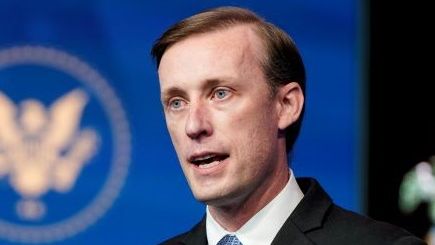
Iran will face severe consequences if it attacks Americans, the White House said on Sunday, including former officials sanctioned by Tehran for the 2020 killing of Gen. Qasem Soleimani in a drone strike.
White House National Security Adviser Jake Sullivan said Iran's sanctions on Saturday came as Tehran's proxy militias continue to attack American troops in the Middle East.
"We will work with our allies and partners to deter and respond to any attacks carried out by Iran," Sullivan said in a statement. "Should Iran attack any of our nationals, including any of the 52 people named yesterday, it will face severe consequences."
Top Iranian officials have repeatedly issued threats to take revenge for Soleimani’s killing. The Qods Force general was Iran’s top military and intelligence operator in the region, organizing and guiding militant proxies.
The US warning came as nuclear talks continue in Vienna to restore the 2015 nuclear agreement, which would lift US sanctions and restrict Iran’s fast-developing nuclear program. Iran has refused to directly negotiate with the United States. Other participants in the talks act as mediators.
Iran on Saturday imposed sanctions on dozens more Americans, many of them from the US military, over the 2020 killing of Soleimani.
Iran's Foreign Ministry said 51 Americans had been targeted for what it called "terrorism" and human rights violations. The step lets Iranian authorities seize any assets they hold in Iran, but the apparent absence of such assets means it will likely be symbolic.
It was not clear why Sullivan's statement referred to 52 people when Tehran said it had sanctioned 51.
Iran’s Supreme Leader Ali Khamenei on January 1 lashed out at former US president Donald Trump and others for Soleimani’s killing, saying they “will pay back for their crime.” Other Iranian officials have repeated similar threats in the past week as Tehran marked the second anniversary of Soleimani’s death.
Iran-backed militias in Iraq and Syria accelerated drone and rocker attacks on US forces in the first week of January.
Iran's sanctions include former president Donald Trump, former CIA directors Mike Pompeo and Gina Haspel, former UN envoy John Bolton, former defense secretaries Mark Esper and Christopher C. Miller. The list also included US General Mark Milley, chairman of the Joint Chiefs of Staff and former White House national security adviser Robert O'Brien.
Soleimani, was killed in Iraq in a drone strike on Jan. 3, 2020, ordered by then President Donald Trump, who said he had to eliminate a “terrorist leader” who posed an immediate danger to Americans.
With reporting by Reuters
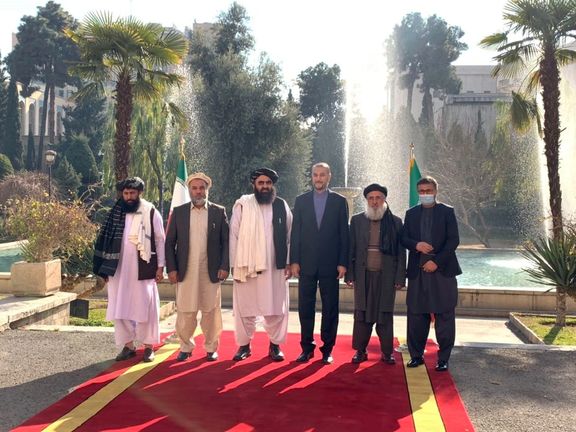
Taliban's acting foreign minister Amir Khan Muttaqi said Sunday that he has held positive talks with Iranian officials during his visit to Iran.
Muttaqi, who arrived in Iran Saturday evening at the head of a high-ranking delegation, said on Sunday that his meetings with Iranian officials were focused on trade, oil, transit and security.
He noted that the Taliban seeks to establish good relations with all the countries in the region, particularly with Afghanistan’s neighbors.
He met with Iranian Foreign Minister Hossein Amir-Abdollahian and Hassan Kazemi Qami, the Iranian president's special envoy to Afghanistan. Tehran says some agreements were reached on banking cooperation, cross-border markets, mining, and sports during the meetings.
Afghanistan International quoted unnamed sources as saying that during his stay in Tehran, Muttaqi also held meetings with some opposition figures including former Herat governor Mohammad Ismail Khan and Mawlawi Habibullah Hesam, the head of Afghanistan’s Islamic Brotherhood.
It added Muttaqi was also scheduled to meet Ahmad Massoud, the leader of the National Resistance Front of Afghanistan, but representatives of the front said the meeting did not happen, although Massoud had traveled to Tehran from Mashhad on Saturday.
Earlier on Sunday, Iran’s Foreign Ministry spokesman rejected reports about Tehran’s decision to hand over the Afghan embassy in Tehran to the Taliban.
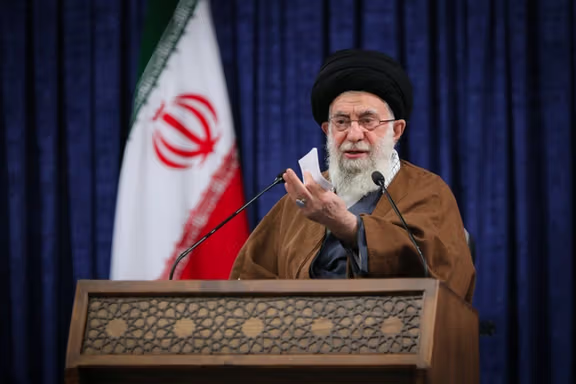
Iran's leader Sunday showed the first public sign of readiness to compromise with the West over the nuclear issue, while maintaining enmity with the United States.
In a televised speech Sunday morning Ali Khamenei said that "Negotiations with the enemy at a certain juncture does not necessarily mean surrendering." The anti-Western ruler of Iran tried to convey the message to his hardliner supporters that although he is prepared for another round of "heroic flexibility"in a bid to have sanctions lifted, his opposition to the United States is unwavering.
"Not surrendering to the enemies, is one of the principles of the Islamic revolution. However, holding talks and negotiating with the enemy at a certain juncture does not mean surrendering to it. We have never surrendered so far, and we never will," Khamenei said.
Khamenei’s statement comes after many politicians and pundits in Iran and abroad have been saying for years that Iran should try direct negotiations with the US, but Khamenei explicitly banned it in 2018.
Portraying the United States as the Islamic Republic's biggest enemy, Khamenei said: "America’s deep hostility and spite toward Iran stems from the Iranian people’s revolutionary, religious viewpoint on the current issues of the world. That is why the US, the leading “arrogant power”, opposes the Islamic Republic of Iran."
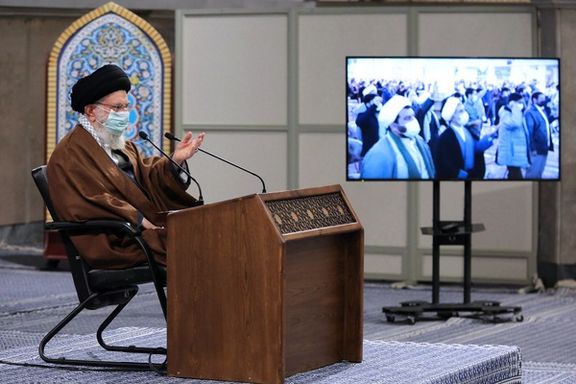
Claiming that US stances vis-a-vis Tehran is based on miscalculations, Khamenei reiterated: "The US system of calculation is defective. It cannot fathom the truths about Iran. When their calculation of the existing situation is wrong, their decisions are wrong too. This is why they have been unsuccessful so far and they will continue to be unsuccessful, God willing."
Based on his accounts of certain episodes in Iran's history in the 18th and 19th and 20th centuries, Khamenei said that only the grand ulema [prominent Shiite clerics] are capable of mobilizing masses of the people against big powers. Khamenei concluded that this reveals why "arrogant powers are against religion, clerics” and Shiite political Islam.
Khamenei reiterated: "The United States is basically against the Islamic regime in Iran because Washington knows that this system is the outcome of religion and is a manifestation of the Iranian nation's religious beliefs." He added: "Religious zeal based on reason turns threats into opportunities. An example of this is the war imposed by Saddam on Iran. The US, USSR, NATO, etc. united in this international war to defeat Iran, but the people’s zeal that is based on faith defeated all of them."
Meanwhile, expounding on his conspiracy theory about the West, Khamenei said that "The enemies are trying to erode Iranians' responsiveness to the principles of the Islamic revolution through a massive propaganda campaign on cyberspace and foreign-based [Persian] media. However, he did not mention that widespread and systematic corruption among clerics and officials has vastly contributed to the erosion of the underlying beliefs in the ruling system.
He also did not mention that many blame his regime's mismanagement for wasting a wealthy country’s resources, or criticism that his own unreasonable ambitions led to wasting billions of dollars on a nuclear program that has had no positive outcome for the people in more than four decades.
Nonetheless, he warned Iranian intellectuals that "It is unfair to say that the principles of the Islamic revolution do not serve the people's interest and do not guarantee their future."
Khamenei's critics even those such as former President Mahmoud Ahmadinejad have said on various occasions that nothing has remained of the main principles of the revolution, namely independence, freedom and an Islamic republic.
Critics have often argued that the regime's over-reliance on Russia and China and massive concessions to them has undermined Iran's independence. Meanwhile, thousands of political prisoners languishing in Iranian prisons, one of whom died in custody on Saturday because of neglect, bear witness that there is no freedom of expression in Iran. Critics say nothing has remained of the idea of a Republic in Iran particularly after the latest round of presidential election where everyone knew the winner months before the voting day.
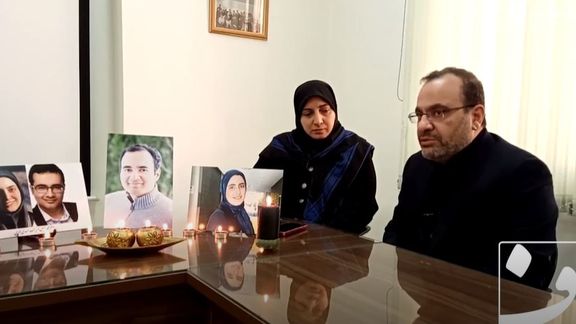
Parents of two victims in the downing of an airliner say it was used as a "human shield" to prevent possible US retaliation in the wake of Iran's missile attack on US bases in 2020.
Dr Mohsen Asadi-Lari, a former high-ranking health ministry official, and his wife Dr Zahra Majd who lost both their children, Mohammad-Hossein and Zeinab, in the downing of the Ukrainian plane on January 8, 2020 have broken their silence about the incident which they say cannot be reduced to "human error" as Iranian authorities claim.
"We have concluded that they used the plane as human shield. I'll be frank … They probably wanted to down it and blame it on the US," Asadi-Lari told Ensaf News, a reformist website, in a long interview conducted Tuesday but published Saturday. He also claimed that similar incidents have happened in the past but did not cite any particular example.
Apparently referring to remarks made by Revolutionary Guard (IRGC) officials, Asadi-Lari said officials have admitted that a war with the US could happen if the plane was not shot down. "They say if the plane was not downed a difficult war would happen the next day. The US would have attacked, and ten million lives would be in danger."
An early-morning disaster
Ukraine's flight PS752 was shot down by two air-defense missiles fired by the IRGC on January 8, 2020, as it took off from Tehran’s Imam Khomeini International Airport. Only hours earlier, the IRGC had fired more than a dozen missiles at Iraqi bases hosting US and coalition troops in retaliation for the killing of the IRGC Qods Force Commander Qasem Soleimani who was targeted and killed in Baghdad by a US drone strike just five days earlier.
Despite expecting retaliation from the US, the IRGC which is responsible for air defense of the capital did not close the civilian airspace in the early morning hours of January 8.
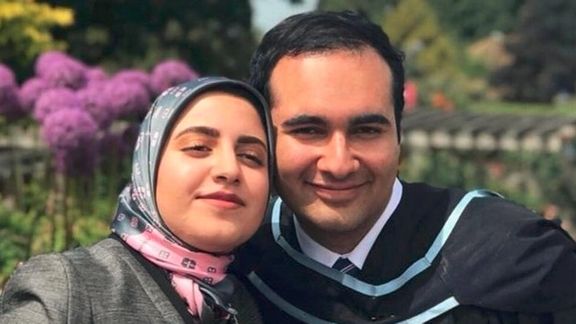
Secretary of Ukraine’s national security and defense council, Oleksiy Danilov, in April told Canada's The Globe and Mail that he believed the downing of the plane was a "deliberate attack" to prevent retaliation for Iran's attack on US forces in Iraq.
The Asadi-Lari family criticized Iran's trial of ten low-ranking military personnel which began in November in Tehran, saying that they were not even sure about the identities of those on trial, as defendants always sat with their backs to the plaintiffs during court sessions.
"The actions taken by the team that planned, ordered, and carried out the firing [of the missiles at the plane] have not been included in the case files," Asadi-Lari said in another interview published Saturday by the Iranian Students News Agency (ISNA). "What happened later, including the cleaning up of the scene and pillage of the belongings of the passengers, destruction or confiscation of some of their belongings [such as electronic devices and phones] are also among the things that should have been reflected in the case files."
Asadi-Laris also accused the authorities of "increasingly distorting the truth". "Woefully, they are adding up to the atmosphere of fear and intimidation," Asadi-Lari told Ensaf News, adding that the families who live in Iran have kept their silence and not spoken with the media out of fear of retribution.
Families desparate for truth and justice
In his interview with ISNA, Asadi-Lari said that more than 100 families including his family have filed lawsuits with the Iranian judiciary for the prosecution of those responsible, but the court has ignored their claims against some officials including IRGC Aerospace Commander Brigadier General Amir-Ali Hajizadeh.
Hajizadeh took responsibility for the incident three days after official denials of the truth about the incident. Victims' families were informed by Tehran Military Prosecutor's Office in August that Hajizadeh and eight others had been given immunity from prosecution.
Since the admission, Tehran has refused to allow an independent investigation into the incident and according to Ukraine and Canada that had dozens of citizens and permanent residents aboard, has not provided full and convincing answers to questions that can shed light as to what really happened.
On Saturday, Canada in response to an inquiry by Iran International called Iran's downing “a Canadian tragedy” and called for justice and transparency.
A Canadian court just recently awarded C$107 million ($84 million) to the families of six people who had sued Iran. More court cases are pending in Canada.
Lari and his wife, both professors of Iran Medical Sciences University, say the whole family, including their two children who were students in Canadian universities, were devastated by Soleimani's killing and were very worried about a US retaliation for Iran's missile attack while the family was on their way to the airport. Before the flight took off, their son Mohammad-Hossein had been praying for Soleimani who was buried the day before.
Unlike parents and family members of many other victims of the tragedy that killed all 176 onboard, the Asadi-Lari family are not members of the Canada-based association representing the victims' families. The association does not recognize the eligibility of the Islamic Republic's Judiciary for the investigation of the incident and has repeatedly called for top Iranian officials, including Supreme Leader Ali Khamenei as commander-in-chief of the Armed Forces, to be held responsible.